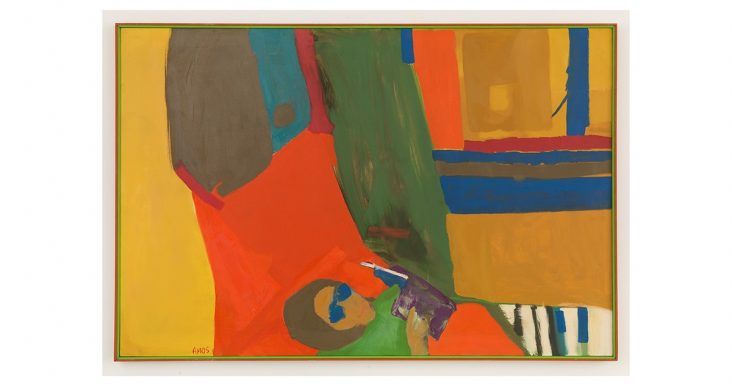Crystal Bridges announces new acquisitions to permanent collection
by September 12, 2019 8:57 am 1,770 views

Emma Amos’ “The Reader,” 1967, is one of several pieces of art recently acquired by Crystal Bridges Museum of American Art in Bentonville. The oil on canvas will be part of the museum’s permanent collection. CREDIT: Courtesy Emma Amos and RYAN LEE Gallery, New York
Crystal Bridges Museum of American Art in Bentonville has added to its permanent collection, both historic and contemporary, with works by Kehinde Wiley, Jordan Casteel, Loie Hollowell, Henry Ossawa Tanner and more than two dozen artworks from the Gordon W. Bailey collection.
“The museum is fully committed to diversifying our collection to better reflect a broad range of perspectives and experiences,” chief curator Austen Barron Bailly said in a statement. “Each new acquisition advances the conversation about American art in ways that are representative of more of the American people and their stories.”
“With the installation of Yayoi Kusama’s Infinity Mirrored Room, we had a chance to reimagine a section of our contemporary gallery with the addition of these recent acquisitions. It’s thrilling to welcome artists like Kehinde Wiley, Jordan Casteel, and Loie Hollowell into the collection and to invite conversations with other works in the collection and our visitors,” said Lauren Haynes, curator of contemporary art at Crystal Bridges and curator of visual arts at the Momentary.
New acquisitions on view in the contemporary art gallery include:
- Portrait of a Florentine Nobleman (2018) by Kehinde Wiley — features Shontay Haynes of St. Louis, Mo. Apart from her pose which Wiley borrowed from the source painting, all of the decisions about presentation — from the subject’s outfit to her tattoos — reinforce a sense of the sitter’s agency and self-creation. This painting is part of a series of artworks that the Saint Louis Art Museum commissioned for an exhibition called Kehinde Wiley: Saint Louis. For these portraits, Wiley selected residents from Ferguson and St. Louis as subjects and created 11 original portraits inspired by artworks in Saint Louis Art Museum’s collection, including the Salviati work.”
Crystal Bridges has acquired several other works by contemporary artists of color and female artists who are pushing boundaries of representation:
- Ourlando (2018) by Jordan Casteel – the subject of the painting is a suit shop owner on 125th Street in Harlem, N.Y. The sitters in Casteel’s paintings are often people she has met and connected within her neighborhood.
- Mother’s Milk (2018) by Loie Hollowell – a painting that is exploring the artist’s experience of pregnancy and motherhood through her primarily abstract artistic practice. Hollowell was featured in the 2018 Crystal Bridges’ exhibition, The Beyond: Georgia O’Keeffe and Contemporary Art.
- Dave Forsythe (2019) by Nathaniel Mary Quinn – Quinn distorts his friend’s body with a collage of other images to speak to the individual complexity of the person he portrays.
- The Reader (1967) by Emma Amos – created in 1967 as part of a suite of works the artist referred to as her “attitude paintings,” Amos portrays herself reading in an otherwise abstract composition. Amos was featured in Soul of a Nation: Art in the Age of Black Power at Crystal Bridges in 2018.
Crystal Bridges has also acquired 23 artworks, by gift and gift/purchase, from the collection of Gordon W. Bailey, a Los Angeles-based collector. Bailey is a noted scholar and advocate of untrained Southern artists, particularly African-American, who struggled during the Jim Crow era:
- Leroy Almon, Adam and Eve (1996); The Slave (1994)
- Thornton Dial Sr., Cocaine Dog (1980s)
- Sam Doyle, Dr. Crow (1982-84)
- Josephus Farmer, Behold the Lamb of God (1980s)
- Roy Ferdinand, Sulton Rogers (1993); Do Not Cross (2004)
- Clementine Hunter, Baptism (1950s)
- Harry Lieberman, The Orphans’ Rights (1960s)
- Joe Light, Colored Hobo (1980s)
- Ronald Lockett, Wolves Look Back (1993)
- J.B. Murray, Untitled (1970s)
- Sulton Rogers, Haint House with 14 Haints (1990s)
- Herbert Singleton, Angola (door)(1990s); Tree of Death (1980s); Untitled (cane)(1990s)
- Welmon Sharlhome, Untitled (architectural with clock)(1990s); Untitled (architectural with dragon clock)(1990s); Untitled (architectural with heart)(1990s)
- Purvis Young, Untitled (bound book with 53 artworks)(1990s); Angels Save the City (1990s); Blues Musicians (1990s); Three Dudes (1990s)
“Gordon W. Bailey’s generous gifts are a welcome addition to our collection,” said Rod Bigelow, Crystal Bridges executive director and chief diversity and inclusion officer. “We’re grateful to be able to highlight and celebrate this array of inspiring works, primarily by African American artists, who have made important contributions to the American art historical canon. We look forward to featuring a selection of the works in a forthcoming focus exhibition and incorporating others into the collection galleries as these works deepen our understanding of our country’s rich and complex history.”
Highlights from Bailey’s group of works include: Dr. Crow, a painting on sheet metal by South Carolina artist Sam Doyle, whose works chronicled America’s unique Gullah culture, and were collected by Jean-Michel Basquiat, and Cocaine Dog, a stirring, mixed media, metal sculpture by Thornton Dial Sr.
“I have thoroughly enjoyed organizing this gift with Rod. He has shown keen insight, and an evolved social consciousness,” Bailey said. “The museum’s progressive board, headed by Crystal Bridges founder and board chair Alice Walton, is making bold moves, and has impressed me with their collective wisdom and commitment. The addition of, the Momentary, an innovative, contemporary, arts center further ensures that the diverse and thriving region will continue to grow for decades to come.”
Crystal Bridges also acquired a painting by the pioneering African American artist Henry Ossawa Tanner (1859-1937) whose work, The Good Shepherd (1917), represents Tanner’s mature painting style and religious subjects deeply rooted in his own faith. This work will be on view in the Early American Art Galleries later this fall.
